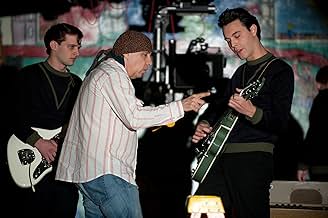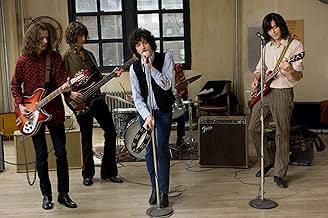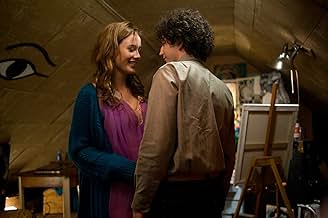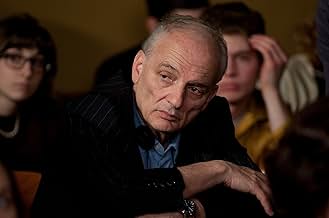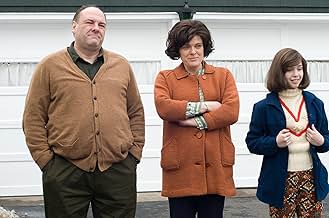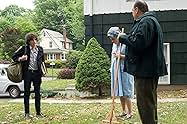AVALIAÇÃO DA IMDb
6,0/10
5,1 mil
SUA AVALIAÇÃO
Ambientado no subúrbio de Nova Jersey na década de 1960, um grupo de amigos forma uma banda de rock e tenta fazer sucesso.Ambientado no subúrbio de Nova Jersey na década de 1960, um grupo de amigos forma uma banda de rock e tenta fazer sucesso.Ambientado no subúrbio de Nova Jersey na década de 1960, um grupo de amigos forma uma banda de rock e tenta fazer sucesso.
- Direção
- Roteirista
- Artistas
- Prêmios
- 3 vitórias e 3 indicações no total
Christopher Bannow
- Dave Smith
- (as Chris Bannow)
Avaliações em destaque
David Chase's Not Fade Away is an exercise in nostalgia in a competent order, meaning that those who enjoy or, above all, relate to the events in the film will appreciate it the most. I'm stuck in the position where I often find my self; on the corner of admiration and disappointment.
Stylistically, David Chase (TV's The Soprano's) and cinematographer Eigil Bryld (Netflix's own TV series House of Cards) couldn't have made a more bleeding-gums representation of the 1960's if they tried. It looks marvelous in all its polished, minimalist glory. Thematically and applicably, there should've been so much more of a story to tell about a garage band that never made it despite determination to "not fade away." For this reason, the film can be viewed as one where talents embrace culture, chew scenery, and nothing more.
The story concerns Douglas (John Magaro), a young man in the 1960's during a time of The Vietnam War and inevitable social change. Family values and daintiness are becoming more lenient, and views on the war divide parents, who sat back and formed opinions on it, and teenagers who had to fight it. Douglas decides to round up a few pals and start a garage band with intent to "make it big" like the iconic Beatles and Rolling Stones. Faced with loud opposition from his demanding bigot of a father (James Gandolfini) and attachment to his girlfriend (Meg Guzulescu), Douglas must now keep a band together without alienating those close to him.
This is a story that through heatbreak, aspirations, and prolific failures could've made a gripping film and possibly an emotional one. The downside is through Chase's direction does the film feel sterile and ill-equipped. He doesn't seem to possess any form of relation or personal resonance with his characters, and this awkward coldness halts the film's ability to allow its audience to admire if even differentiate the teenagers the sixties was known to birth.
What we are left with, predominately, is an egg with a firm, ambitious, beautifully crisp shell, but sub-par, underwhelming contents. "Style over substance" would seem to be an appropriate term, but I hesitate to even call it that seeing as social order, parental discrepancies, and culture shock - all easy items to exclude or nudge out of bounds - are touched on and explored considerably. One of the tensest scenes, and arguably the best, is when Douglas is at dinner with many of his relatives, remaining silent while they discuss emerging culture and minorities in a wonderfully ethnocentric way. Douglas is ostracized and belittled for his optimism on his garage band project and his long, "hippie" hair before telling off his father and exiting the room.
Chase definitely understands complex changes of norms and societal disconnect between parents and youths. However, his apparent lack of interest in his characters, giving them a shocking lack of depth and personality, undermines the power Not Fade Away could've head if it resonated with its target audience (those now in their forties or fifties). Yet, its characters are as vacant as clip-art pictures of teenagers from the time period. There's a powerful, life-affirming, deeply involving story in the material Not Fade Away provides and I anxiously await its telling by a director with more of an attitude and opinion on the subject.
Starring: John Magaro, Meg Guzulescu, and James Gandolfini. Directed by: David Chase.
Stylistically, David Chase (TV's The Soprano's) and cinematographer Eigil Bryld (Netflix's own TV series House of Cards) couldn't have made a more bleeding-gums representation of the 1960's if they tried. It looks marvelous in all its polished, minimalist glory. Thematically and applicably, there should've been so much more of a story to tell about a garage band that never made it despite determination to "not fade away." For this reason, the film can be viewed as one where talents embrace culture, chew scenery, and nothing more.
The story concerns Douglas (John Magaro), a young man in the 1960's during a time of The Vietnam War and inevitable social change. Family values and daintiness are becoming more lenient, and views on the war divide parents, who sat back and formed opinions on it, and teenagers who had to fight it. Douglas decides to round up a few pals and start a garage band with intent to "make it big" like the iconic Beatles and Rolling Stones. Faced with loud opposition from his demanding bigot of a father (James Gandolfini) and attachment to his girlfriend (Meg Guzulescu), Douglas must now keep a band together without alienating those close to him.
This is a story that through heatbreak, aspirations, and prolific failures could've made a gripping film and possibly an emotional one. The downside is through Chase's direction does the film feel sterile and ill-equipped. He doesn't seem to possess any form of relation or personal resonance with his characters, and this awkward coldness halts the film's ability to allow its audience to admire if even differentiate the teenagers the sixties was known to birth.
What we are left with, predominately, is an egg with a firm, ambitious, beautifully crisp shell, but sub-par, underwhelming contents. "Style over substance" would seem to be an appropriate term, but I hesitate to even call it that seeing as social order, parental discrepancies, and culture shock - all easy items to exclude or nudge out of bounds - are touched on and explored considerably. One of the tensest scenes, and arguably the best, is when Douglas is at dinner with many of his relatives, remaining silent while they discuss emerging culture and minorities in a wonderfully ethnocentric way. Douglas is ostracized and belittled for his optimism on his garage band project and his long, "hippie" hair before telling off his father and exiting the room.
Chase definitely understands complex changes of norms and societal disconnect between parents and youths. However, his apparent lack of interest in his characters, giving them a shocking lack of depth and personality, undermines the power Not Fade Away could've head if it resonated with its target audience (those now in their forties or fifties). Yet, its characters are as vacant as clip-art pictures of teenagers from the time period. There's a powerful, life-affirming, deeply involving story in the material Not Fade Away provides and I anxiously await its telling by a director with more of an attitude and opinion on the subject.
Starring: John Magaro, Meg Guzulescu, and James Gandolfini. Directed by: David Chase.
David Chase's earnest mix of rock 'n roll, young love and family drama is overlong and sloppy, aspiring to be a defining examination of the Sixties but rendered trite by trudging out references to every historic moment (in this, it's similar to "Lee Daniels' The Butler") and wallowing in misguided pronouncements about the Vietnam War, capitalism and rock's purity; the intent is to advance the father-son conflict between lead John Magaro and a wasted James Gandolfini. (In fact, Chase unintentionally portrays rock music as a negative force, divisive enough to destroy families.) Chase's strength as the creator of "The Sopranos" was in his carefully plotted backstory that forced the viewer to pay close attention upfront; here, he employs a similar approach, but without the expanse a mini-series affords the result is disjointed and incomplete: all of the stories he introduces are either left unsatisfactorily unresolved or spontaneously concluded. It doesn't help that his characters are inherently unlikable (Magaro is a good example), mere caricatures (co-stars Jack Huston and Will Brill) or blanks (love interest Bella Heathcote). The film's sole asset is Steven Van Zandt's musical curation, though he eschews the deeper tracks in favor of songs even the casual fan will recognize.
David Chase's anticipated Not Fade Away not only jumbles itself into an indulgent story, constantly keeping the audience at an arm's length but it's overly stretched and uneven not utilizing the strong talents in the film like James Gandolfini, Jack Huston, and John Magaro. A natural comparison to Almost Famous (2000), the film doesn't hold a candle to Cameron Crowe's homage to music. Showcasing outstanding music of the 1960′s and 1970′s, Chase manages to capture moments of the young adolescent mind longing to be more. Lead Magaro delivers a character transformation of mind and body, a turn that elevates the film considerably. The great Jack Huston, an actor that will likely be one of the biggest things in Hollywood any minute now, delivers an aggressive supporting turn reminiscent of Channing Tatum's work in A Guide to Recognizing Your Saints (2006). Bella Heathcote shows tenderness and promise but undervalued and virtually unused. James Gandolfini, stands out with charisma and garners much of the big laughs. A great character actor like Gandolfini should be given room to move. The film ultimately fails because it never feels like Chase knows his film or where he wants it to go. The last twenty minutes feel unneeded, unearned, and thrown together for an "artistic" catalyst with no emotional or technical effect whatsoever. A large disappointment.
just finished up watching this growing up in the sixties, and rock and roll movie. for the earliest of the Baby Boomers, this is the movie for you, and the music will rock your soul. A teenage band, with inspirations maybe a little too optimistic. With a top notch cast, and great story telling, this was indeed entertaining and very realistic, since I was in a little band back then too. James Gandolfini is great as a pretty typical sixties Father, coping with everyday problems and a pretty wacky Wife. The teenagers are very realistic, and you could tell it was written pretty much biographical. It works for me. Highly recommended especially to us Boomers.
As with most filmmakers who work in themes, you should watch this to see Chase's perspective on the material, not for the story itself. Its seemingly formless structure will throw off some viewers, but it's very much in line with his body of work, being less about the music and the era and more about the effects of the passage of time, specifically the tug of the past on the present and the evolution of character (or not) as the years go by. It's an autobiographical elaboration on the themes in the dark and sad final seasons of the Sopranos, though it does have plenty of the usual witty Chase touches as well, like the kids dancing away the JFK retrospective. There's a pervasive sense of nostalgia because the setting feels realistic, neither idealistic like a Spielberg/Lucas movie nor revisionist like the progressive Pleasantville-type movies whose intention is to show us all how the past wasn't as enlightened as today. The downside is that it's such a well-covered period and milieu (for my generation The Wonder Years is the reference point) that it's hard to find something original to say. But go in with the understanding that it's more complex than it appears and it'll give you plenty to chew on afterward. At one point the lead and his girlfriend are watching Blow-Up and he comments on how strange it is there's no music to tell you when someone's going to get killed, and she replies that the sound of the wind in the trees is the music, which sums up this movie pretty well.
Você sabia?
- CuriosidadesMost feature films slot 1-2 percent of production costs for the music budget, but in "Fade', music supervisor Steven Van Zandt, had about 10% of the $20-million-plus budget or at least $2 million.
- Erros de gravaçãoNobody said "elementary school" in North Jersey, at least not those days. Grades 1-6 (or 1-8 if you went to Catholic school) was called "grammar school."
- ConexõesFeatures No Sul do Pacífico (1958)
- Trilhas sonorasPeppermint Twist
Written by Joey Dee (as Joseph Di Nicola) and Henry Glover
Performed by Joey Dee and The Starliters
Courtesy of Rhino Entertainment Company
By arrangement with Warner Music Group Film & TV Licensing
Principais escolhas
Faça login para avaliar e ver a lista de recomendações personalizadas
- How long is Not Fade Away?Fornecido pela Alexa
Detalhes
Bilheteria
- Orçamento
- US$ 20.000.000 (estimativa)
- Faturamento bruto nos EUA e Canadá
- US$ 610.792
- Fim de semana de estreia nos EUA e Canadá
- US$ 19.182
- 23 de dez. de 2012
- Faturamento bruto mundial
- US$ 636.399
- Tempo de duração1 hora 57 minutos
- Cor
- Mixagem de som
- Proporção
- 1.85 : 1
Contribua para esta página
Sugerir uma alteração ou adicionar conteúdo ausente





